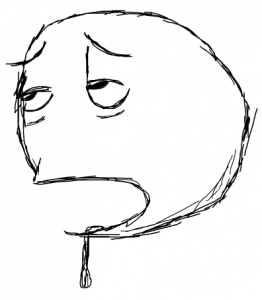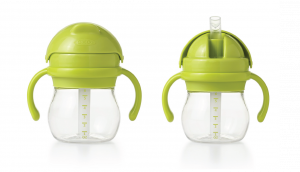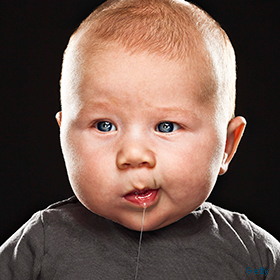Drooling and Decreased Muscle Tone
 Sometimes something that sounds so innocent can be a symptom of a larger issue. Drooling in infants and toddlers is often associated with teething, but can also be the sign of a larger health problem that can affect your child’s speech development.
Sometimes something that sounds so innocent can be a symptom of a larger issue. Drooling in infants and toddlers is often associated with teething, but can also be the sign of a larger health problem that can affect your child’s speech development.
Drooling and Teething – A Normal Process
When your baby begins to teethe, often around 6 months of age, you will likely see an increase in drool. There are no front lower teeth to hold back the saliva stream, and the body naturally increases saliva in a baby’s mouth to prepare for the healthy eruption of teeth. Saliva has mild antibacterial properties that help to keep your baby’s mouth healthier, and as more teeth erupt the levels of saliva can be expected to increase.
Drooling and Muscle Tone Issues – What Are the Causes?
While drooling for most babies and toddlers is part of a natural process, sometimes either excessive drooling or drooling beyond teething can signal a bigger issue. Researchers have developed four theories as to why drooling might be the sign of something more than teething.
1. Some children are not aware that they are drooling.
2. Some children do not swallow frequently, or at least enough to be rid of the excess saliva.
3. Some children do not swallow completely, leaving some saliva in the mouth each time.
4. Some children do not seal their lips when trying to swallow their saliva.
It might be hard to imagine not being aware of excessive drooling, or difficult to even try to swallow with your mouth open, but for kids who have decreased muscle tone around the mouth and other problems this is their reality. There are several underlying reasons why a child might have excessive drooling connected to any of these four above theories:
- Hypotonia is a condition where a person has decreased muscle tone, including those responsible for swallowing and speaking.
- Cerebral palsy is a condition that encompasses many levels of brain developmental problems, most noticeably affecting a child’s motor abilities.
- Down syndrome is a condition that affects both the mental and physical development of a person, and which can contribute to drooling.
- Childhood apraxia of speech is a neurological condition that affects the communication between the brain (what it wants to say) and the mouth muscles (that are supposed to help form the words)
Kids develop at different rates with different levels of efficiency, and sometimes facial and neck muscles are not as strong as typically found at certain ages or there is a lack of coordination between the muscle groups responsible for stopping drooling. This can happen without a major health condition as a cause. Drooling caused by teething typically subsides by around ages 2-3 years. If your child is an older toddler and still excessively drooling without any other known health issues, it might be time to take a closer look.
Drooling – Why Should I Care and What Can I Do?

Excessive drooling can not only be messy, but it can lead to social problems as well, especially in individuals who don’t have visibly noticeable health conditions. Drooling can also signal a problem with muscle tone and coordination, for whatever underlying reason, that will contribute to speech and communication delays. If your child’s mouth isn’t working properly to prevent excessive drooling, articulation and other speech milestones might be negatively affected. It can also be a sign of feeding problems that can lead to nutritional deficits. There are several things you can do to try to minimize the drooling and improve the muscle tone needed for proper speech development.
- Work with your child’s doctor to determine if there is an underlying health problem related to the drooling.
- Work with an SLP and physical therapist to develop and use exercises that will improve swallowing.
- Skip the sippy cup and teach your child to use a straw. Straws help encourage children to purse their lips together and use the muscles needed for swallowing. As a company of parents, Speech Buddies recommends the OXO Tot Transitions Straw Cup or Thinkbaby Thinkster Straw Bottle. For a stainless steel option, we love the THERMOS Straw Bottle.
- Skip the sugary drinks. They are harmful to your child’s oral health, can increase the odds of obesity, and can promote a thicker saliva that is harder to clear from the mouth during swallowing.
Some of the links provided on Speech Buddies are affiliate links. We receive a small commission on sales made through these links. We only endorse products that we love.



